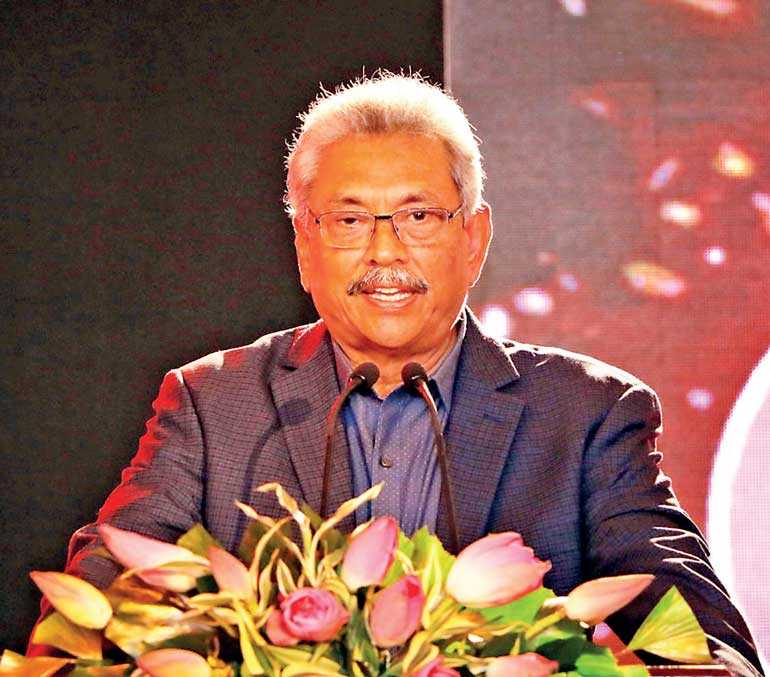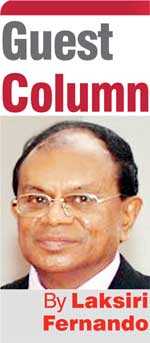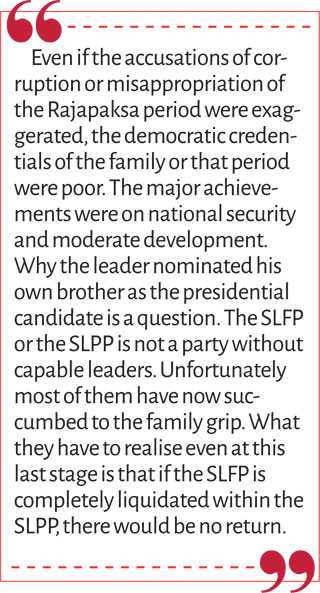Tuesday Feb 17, 2026
Tuesday Feb 17, 2026
Wednesday, 4 September 2019 00:00 - - {{hitsCtrl.values.hits}}

Whatever the mistakes in the past or in recent times, the Sri Lanka Freedom Party (SLFP) is an important component in the democratic equation in the country. It has been the middle path party, the general orientation of which the country needs in politics, economics, external relations and  cultural/national issues, although the party itself had failed many times in these respects. Critics may remember the ‘Sinhala Only’ policy in 1956. Obviously, there is no straight line in the middle path.
cultural/national issues, although the party itself had failed many times in these respects. Critics may remember the ‘Sinhala Only’ policy in 1956. Obviously, there is no straight line in the middle path.
Sri Lanka has come to cross roads. A rejuvenation of a middle path is necessary. A polarisation particularly between ‘neo-liberal-anarchy’ and ‘nationalist-authoritarianism’ has emerged, among other rifts.
The (then) General Secretary of the SLFP and some other members played a pivotal role in 2015 change, breaking away from the previous regime, which was necessary for democratic evolution of the country. The party itself participated in a coalition with the UNP until 2018. After that significant change in 2015, there was an admission of mistakes by the previous leader of the party, Mahinda Rajapaksa, whether genuine or not.
The SLFP or its present leader thereafter however failed to bring the new government into a reasonable middle course particularly in economic matters and external affairs. The reasons were multitude. The international pressures and ideological orientations of the main partner, the UNP were strong. That situation has led to the emergence the new party, the Sri Lanka People’s Party (SLPP), out of the frustrations and disarray of the SLFP.
The SLPP however is not the SLFP. The SLPP does not appear to follow a middle path particularly in the political front and on cultural/national issues. While no one should hesitate to appreciate the role that the Rajapaksa family has played in Sri Lankan politics, it is too much for its leader to nominate his own brother as the presidential candidate, however capable he is. Everyone knows that the SLPP is a formation that was engineered by another brother. The formation undoubtedly was inevitable given the SLFP’s delay in leaving the sinking ship.
However keeping a major political party within a single family grip is not good for the country or democracy. Even if the accusations of corruption or misappropriation of the Rajapaksa period were exaggerated, the democratic credentials of the family or that period were poor. The major achievements were on national security and moderate development. Why the leader nominated his own brother as the presidential candidate is a question? The SLFP or the SLPP is not a party without capable leaders. Unfortunately most of them have now succumbed to the family grip. What they have to realise even at this last stage is that if the SLFP is completely liquidated within the SLPP, there would be no return.
It is true that the SLFP cannot win the presidential elections. Its performance at the last local government elections was hopelessly poor. That was mostly determined by the fact that they were with the UNP, unnecessarily for a long period. Delay in leaving the government angered their voter base and the people in general. People were also protesting for not holding local government elections for a long period. However those factors might not work in the same manner at the presidential election. 
Most of politics in Sri Lanka are determined by the greed for position, power and benefits. It is possible that many of the SLFP leaders who go behind the SLPP at present are hoping for such benefits. However, if the SLPP wins both elections easily, the presidential and parliamentary, the SLFP leaders would be marginalised.
A Gotabaya Rajapaksa regime would be different even to the past Mahinda Rajapaksa regime. It would be efficient, but autocratic. For such a regime, the present orientation of SLFP leaders might be a liability. GR undoubtedly would go for new blood and new brains. Such a regime might be good for security or the economy in the short run, but not for democracy or freedom. A middle path or a balanced approach should take all those into account.
The SLFP is a party which had capabilities of balancing between various people and policies. That was the strength and also the weakness, depending on the situation. However, it had a clear orientation for a middle path from the beginning, based on both traditional values as well as universal principles. Let me outline briefly some historical landmarks.
Although S.W.R.D. Bandaranaike is commonly branded as a Sinhala communalist, during the time he returned from Oxford, he was talking about ‘common humanity’. I am not aware any other leader using such terminology other than S.W.R.D. He was leaning towards the Sinhala masses for obvious practical reasons, and that was also the community through which he could build a political movement.
As he declared at the launching of the SLFP in 1952, the first task would be to unite and mobilise the Sinhala masses. The second is to unite all communities under one national banner. While the two tasks obviously had some contradictions, the second task still remains unfulfilled by the party. On the other hand, the SLFP was the party which had a progressive agrarian policy for the benefit of the poor, in the south as well as in the north.
It also envisaged mixed economic policies for the country that could be considered valid even today, if implemented with a major emphasis on market mechanisms. It was a party which was open to the views of the left, on some socialist policies. Some were inward looking (a closed economy) and some were forward looking (protection of the poor). Equally important was the non-aligned policies in external affairs that could be interpreted today as the need to seek an east-west balance.
Most importantly, the SLFP has been an important democratic component in the given context of Sri Lanka and the party system. As a democratic party it has a role to play even today at this crucial juncture. There is nothing wrong in the SLFP coming into some alliance with the SLPP, particularly for the parliamentary elections. However in the case of the presidential election, if it completely succumbs to the SLPP that could strengthen the authoritarian tendencies in the SLPP. Family rule is something that the country should avoid, possibly balance through other forces, and go beyond.
It would be a disaster for the SLFP if it does not contest and consider the SLPP candidate as its own candidate. After a possible victory for the SLPP, the SLFP would be marginalised or completely neglected. The best policy for the SLFP is to offer the second preference to the SLPP candidate or allow the voters to decide.
There is a great possibility that the UNP would officially nominate Karu Jayasuriya and not Sajith Premadasa. However, it is difficult for me to exactly predict from a distance. If that is the case, an alliance between the UNP-rebels and the SLFP also might be possible. Even otherwise, the frustration among the UNP followers might turn them to the SLFP and not to the SLPP. What is important at the forthcoming presidential election is to prevent carte blanche to possible authoritarianism and family rule. This is not a prediction but a suggestion for the sake of democracy.